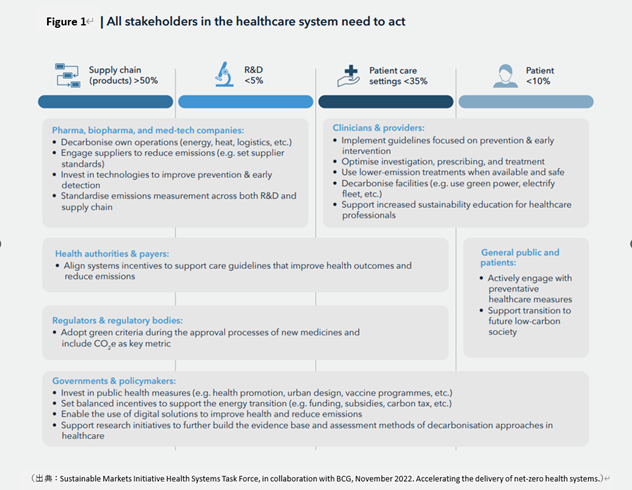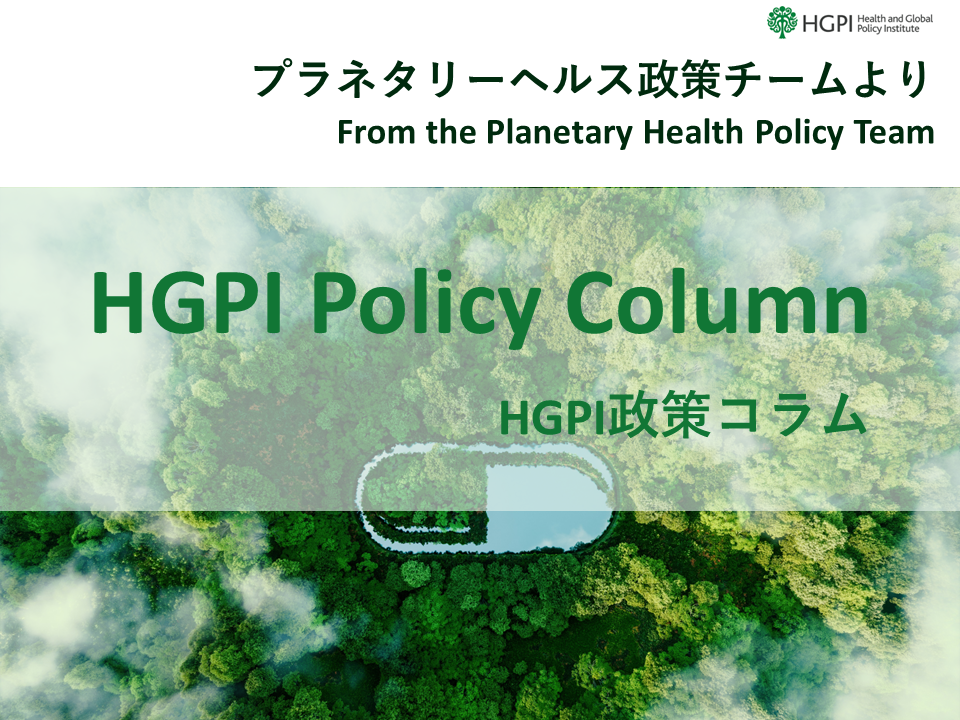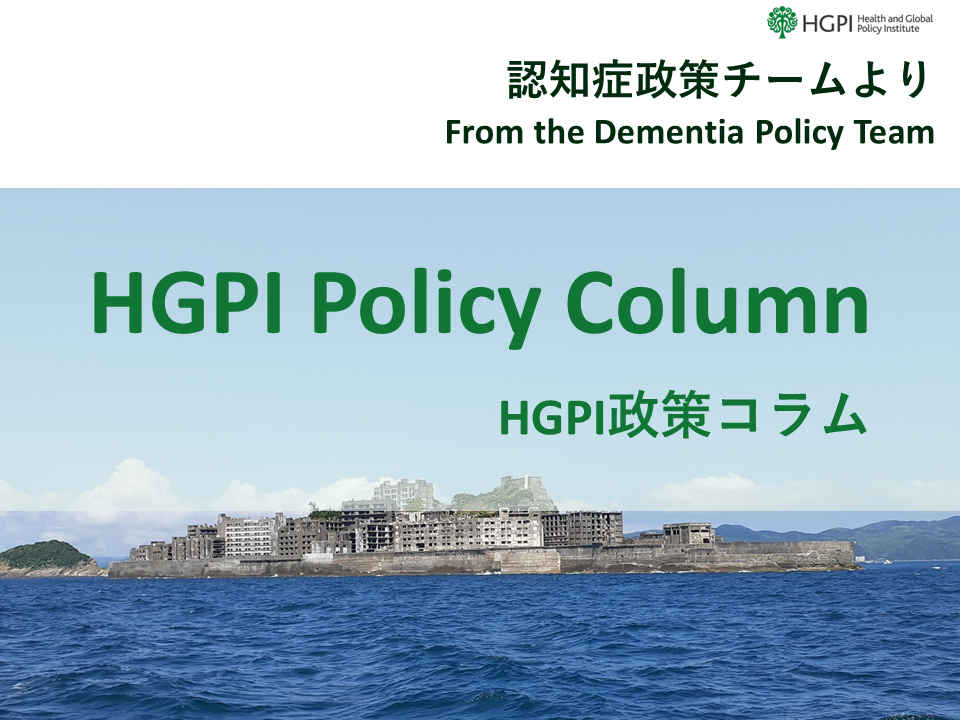[HGPI Policy Column] (No.40) — From the Planetary Health Project “Part 7: Introduction of SMI’s Recommendations for Accelerating Net Zero Health System Delivery”
date : 2/19/2024
![[HGPI Policy Column] (No.40) — From the Planetary Health Project “Part 7: Introduction of SMI’s Recommendations for Accelerating Net Zero Health System Delivery”](https://hgpi.org/en/wp-content/uploads/sites/2/column-40-top.png)
<POINTS>
- On November 3, 2022, SMI’s Health Systems Task Force released a report titled “Accelerating the Delivery of a Net Zero Health System – An Overview of Practical Recommendations and Actions to Support People’s Health, a Healthy Planet and Society”.
- The healthcare sector contributes approximately 5% of total global GHG emissions, with three major components: products and supply chain (50%), patient care (45%; which includes direct emissions from care facilities and patients), and research and development (5%).
- The report makes recommendations for actions that all health care providers should take to provide a net-zero health care system, and actions that the SMI Health System Task Force is committed to.
Introduction
In this column, the seventh in the series, we present the report released in November 2022 by the Health Systems Task Force of the Sustainable Market Initiative (SMI), “Accelerating the Delivery of a Net Zero Health System -An Overview of Practical Recommendations and Actions to Support People’s Health, a Healthy Planet and Society-“.
SMI is a sustainability initiative created by Prince Charles (now King Charles III) and launched at the annual meeting of the World Economic Forum (WEF: World Economic Forum) in Davos in 2020. SMI is an initiative to promote sustainability and focuses on sustainability and environmental responsibility. It is engaged in a variety of initiatives to restructure and realign the marketplace to promote more environmentally responsible business practices.
SMI is discussing a “2030 Roadmap for Companies Moving Forward to a Sustainable Future”. This report was co-authored and published by the Health Systems Task Force, one of the task forces of the roadmap.
The report outlines practical recommendations and actions to accelerate the delivery of a net-zero health care system with in the health care sector, which contributes approximately 5% of global greenhouse gas (GHG) emissions, in order to support human health, a healthy planet, and society. The report is rich in guidance for the realization of a sustainable health system, and will be of significant help in making this a reality in Japan. The following is an introduction to the contents of the report.
What Stakeholders in the Healthcare Sector Should Do to Reduce Emissions
The three main areas of GHG emissions in the healthcare system are products and supply chain (50%), patient care (45%, including direct emissions from care facilities and patients), and research and development (5%). Given this, the report describes actions that organizations, individuals, and others in different positions in healthcare should take to reduce emissions with the following specific recommendations (Figure 1).

For example, pharmaceutical, biopharmaceutical, and medtech companies can reduce emissions from their own products and activities by decarbonizing their facilities and working with business partners to address upstream emissions. Furthermore, as companies continue to invest in technologies for disease prevention, early detection, and diagnosis, they can improve patient outcomes, reduce healthcare demand, and increase efficiency of care. In Japan, eco-friendly initiatives such as the recovery and reuse of insulin pen injectors are underway, as well as the practical application of early diagnosis technology using AI technology and genetic information.
The health care providers and provider facilities can prevent the onset and progression of disease through early intervention, including the implementation of appropriate investigations and prescribing practices. Renewable energy can be used to reduce emissions associated with care pathways, which are complex interventions to determine and organize care for a well-defined group of patients in a facility or over a well-defined period of time, while simultaneously striving to maintain or improve population and patient health. Green plans can be developed, such as the introduction of renewable energy and the selection of less emissions-intensive medical supply equipment. Renewable energy also contributes to reducing energy dependence on other countries and improving resilience in the event of an emergency or disaster by decentralizing the energy supply. From the perspective of a Business Continuity Plan (BCP), it is also effective in providing stable and continuous care to patients. In addition, medical and dental schools in Japan are planning to include climate change and health in their core curricula from 2024, with the project expected to contribute to educational programs for healthcare professionals and patient education with an emphasis on sustainability in healthcare.
Health authorities and insurers can push for implementation of care guidelines focused on improving patient outcomes and reducing emissions from treatment by aligning incentives around a net-zero health care system, and regulators can provide clear guidance to accelerate approval of measures to improve emission reduction of existing products. It can provide clear guidance and support to accelerate approvals and visualize emissions by disease or treatment, which can be seen as a key metric in new treatment assessments. It is encouraged that the healthcare sector actively adopt and collaborate with Life Cycle Assessment (LCA), which is being promoted by various organizations in Japan. In addition, various countries and companies have started initiatives to reform their insurance systems with the goal of achieving net-zero insurance, starting with the Greener NHS in the U.K., followed by the launch of the Net-Zero Insurance Alliance by the United Nations Environment Programme (UNEP). The government and policy makers should also refer to these efforts.
Governments and policymakers can encourage decarbonization by promoting balanced legislation that protects both the health of people and the health of the planet with respect to emissions. This includes investing in public health to promote a healthier environment, providing incentives for energy transitions, and encouraging the use of digital solutions. For example, the Digital Transformation (DX) of healthcare that is being promoted in Japan will not only improve the efficiency and quality of healthcare, but also contribute to a green society. On the other hand, each facility will have to bear additional costs not only for medical DX but also for capital investment such as the introduction of renewable energy. While subsidies are available from various ministries and local governments to promote Green Transformation (GX), and opportunities for general companies are increasing, the healthcare sector also needs a country-wide effort to promote GX.
The general public and patients can improve health outcomes, reduce emissions, and manage their daily lives as citizens of a future low-carbon society by taking an active role in preventive healthcare measures such as improving their own health and opting for less emissions-intensive treatments. It is also beneficial to obtain information from health education courses held by local governments and other organizations, such as those on heat stroke prevention.
Actions Taken by the SMI Health Systems Task Force
The SMI Health Systems Task Force, which released this report, is a collaborative coalition of public and private sector leaders taking scalable action to accelerate the delivery of a net zero health system to improve the health of individuals, society and the planet.
Its members include AstraZeneca, GSK, Merck KGaA, Novo Nordisk, Reckitt, Roche, Samsung Biologics, Sanofi, National Health Service England, Sustainable Healthcare Coalition, UNICEF (United Nations Children’s Fund, Pavia University, and the World Health Organization (WHO).
The SMI Health Systems Task Force is also a partner in WHO’s Alliance for Transformative Action on Climate and Health (ATACH). More than 60 countries participate in this platform at the level of health ministers.In order to realize the ambitious goal set at COP26 of “building climate resilient and sustainable health systems”, the Alliance is working to develop a Climate Change and Health Vulnerability and Adaptation Assessment (V&A) as an effort to build health systems that are resilient to climate change. To realize this goal, the project will conduct a vulnerability and adaptation assessment (V&A) on climate change and health, develop a Health National Adaptation Plan (HNAP) based on the V&A, and promote financing through the HNAP. In addition, the Task Force is committed to supporting countries in their efforts to develop sustainable low-carbon healthcare systems by committing to initiatives such as conducting baseline assessments of GHG emissions in the healthcare sector and developing action plans and roadmaps.
Task force members have identified the following three perspectives as action goals and initiatives to lead and accelerate the delivery of net-zero healthcare systems.
First, actions to address emissions from the supply chain include the following:
- Set short-term emission reduction targets aligned with the 1.5°C pathway and dedication to achieving net zero emissions by 2045.
- Achieve an 80%-100% switch to renewable power for operations by 2030 and jointly evaluate Power Purchase Agreements (PPAs) with renewable energy suppliers in China and India for 2023.
- Jointly explore green heat-based responses by 2025 and accelerate the adoption of effective and scalable technologies.
- Transition company vehicles to zero-emission vehicles by 2030 and explore green logistics by 2025.
- Align common supplier selection criteria to boost emissions reductions across the supply chain.
Many participating companies, including AstraZeneca, are working vigorously to decarbonize by converting 100% of their energy consumption to renewable energy sources, including in their factories and switching sales fleet to electric vehicles. Lonza and Novartis are also contributing to decarbonization at the supply chain level by participating in a task force effort to procure renewable energy in China.
Second, the following actions to drive emissions reductions in patient care pathways include:
- Partnering and collaborating with healthcare policy makers, regulators, insurers and healthcare providers, and hospitals around the world to raise awareness of the needs and opportunities for decarbonizing care pathways.
- Develop standards and tools for emissions calculations for specific diseases so that stakeholders can measure and track emissions across care pathways and evaluate decarbonization strategies.
- Coordinate a common framework for conducting LCA while also working with members of the private sector who are committed to publishing product-level LCA data across their products to improve transparency about emissions from treatments.
For example, Johnson & Johnson “Delivering more sustainable products and solutions,” Pfizer “Greener Processes,” Takeda “Protecting our planet: Sustainable products,” and Novo Nordisk “Protecting our planet: Sustainable products” have contributed to LCA initiatives by developing the Care Pathway Carbon Calculator, adopting green chemistry, and recycling medical and pharmaceutical devices. While it has been difficult to capture emissions at the product level and various stages of the biopharmaceutical value chain, these efforts will help contribute to a sustainable healthcare system that integrates quality care and decarbonization, and will encourage people to make these choices.
Third, actions to address emissions from clinical research include each of the following:
- Work to develop a common framework by 2023 and begin measuring GHG emissions from phase 2 and 3 clinical trials.
- Companies should aim to report emissions generated from phase 2 and 3 clinical trials for trials starting in 2025.
- Align new trials with companies’ decarbonization pathways and set trial emissions reduction targets for 2030 at the latest.
- Provide incentives for clinical research organizations and clinical trial-related suppliers to engage in a framework to measure and reduce emissions, including through the use of digital solutions.
- Incorporate a review of ways in which digital solutions can reduce emissions, with a goal of at least 90% of clinical trials starting in 2025.
Clinical trials have been identified as a source of significant GHG emissions, yet not enough has been done to address them*. Currently, “Decentralized Clinical Trial (DCT)” is gaining popularity worldwide and may be an option to reduce GHG emissions.
Conclusion
Climate change is now an urgent issue that affects lives and livelihoods throughout the world. By recognizing the importance of the practical recommendations and guidelines for action contained in this SMI report, both as a healthcare sector and as individuals, we can accelerate the delivery of a net-zero healthcare system and support people’s health, a healthy planet and society. We hope that this will encourage the Japanese healthcare sector to lead this green transition.
[Reference]
- Sustainable Markets Initiative Health Systems Task Force, in collaboration with BCG, (2022). Accelerating the delivery of net-zero health systems- An overview of practical recommendations and actions In support of healthy people, a planet and society-. https://a.storyblok.com/f/109506/x/96fc198cb8/smi-hstf-executive-summary.pdf.
- National Health Service England. Greener NHS. https://www.england.nhs.uk/greenernhs/. (February 1, 2024)
- Sustainable Markets Initiative. Global healthcare leaders advance sector decarbonisation ahead of COP28. https://www.sustainable-markets.org/news/global-healthcare-leaders-advance-sector-decarbonisation-ahead-of-cop28/.(February 1, 2024)
- Climate Change and Health. https://www.astrazeneca.co.jp/sustainability/climate-change-and-health.html/(February 1, 2024)
- Johnson & Johnson. Delivering more sustainable products and solutions. https://www.jnj.com/environmental-sustainability/products-and-solutions. (February 1, 2024)
- Pfizer Inc. Greener Processes. https://www.pfizer.com/about/responsibility/green-journey/greener-processes. (February 1, 2024)
- Takeda Pharmaceutical Company Limited. Protecting our planet: Sustainable products. https://www.takeda.com/about/corporate-responsibility/corporate-sustainability/sustainability-approach/planet/stories/products/. (February 1, 2024)
- Novo Nordisk A/S. Zero environmental impact. https://www.novonordisk.com/sustainable-business/zero-environmental-impact.html. (February 1, 2024)
- Adshead, F., Salman, R. A., Aumonier, S., et al. (2021). A strategy to reduce the carbon footprint of clinical trials. the Lancet. 398(10297); 281-282. doi:10.1016/S0140-6736(21)01384-2.
Authors
Kozue Matsumoto (Intern, Health and Global Policy Institute)
Eri Cahill (Program Specialist, Health and Global Policy Institute)
Kenta Minamitani (Program Specialist, Health and Global Policy Institute / Senior Associate, Mori Hamada & Matsumoto)
Clara Lim (Intern, Health and Global Policy Institute)
Shu Suzuki (Senior Associate, Health and Global Policy Institute)
joji Sugawara (Vice President, Health and Global Policy Institute)
Top Research & Recommendations Posts
- [Policy Recommendations] The Path to a Sustainable Healthcare System: Three Key Objectives for Public Deliberation (January 22, 2026)
- [Research Report] The 2025 Public Opinion Survey on Healthcare in Japan (March 17, 2025)
- [Research Report] Perceptions, Knowledge, Actions and Perspectives of Healthcare Organizations in Japan in Relation to Climate Change and Health: A Cross-Sectional Study (November 13, 2025)
- [Policy Recommendations] Reshaping Japan’s Immunization Policy for Life Course Coverage and Vaccine Equity: Challenges and Prospects for an Era of Prevention and Health Promotion (April 25, 2025)
- [Research Report] The 2023 Public Opinion Survey on Satisfaction in Healthcare in Japan and Healthcare Applications of Generative AI (January 11, 2024)
- [Research Report] AMR Policy Update #4: Cancer Care and AMR (Part 1)
- [Public Comment Submission] “Assessment Report on Climate Change Impacts in Japan (Draft Overview)” (December 24, 2025)
- [Policy Recommendations] Developing a National Health and Climate Strategy for Japan (June 26, 2024)
- [Research Report] The Public Opinion Survey on Child-Rearing in Modern Japan (Final Report) (March 4, 2022)
- [Research Report] Survey of Japanese Physicians Regarding Climate Change and Health (December 3, 2023)
Featured Posts
-
2026-01-09
[Registration Open] (Hybrid Format) Dementia Project FY2025 Initiative Concluding Symposium “The Future of Dementia Policy Surrounding Families and Others Who Care for People with Dementia” (March 9, 2026)
![[Registration Open] (Hybrid Format) Dementia Project FY2025 Initiative Concluding Symposium “The Future of Dementia Policy Surrounding Families and Others Who Care for People with Dementia” (March 9, 2026)](https://hgpi.org/en/wp-content/uploads/sites/2/dementia-20260309-top.png)
-
2026-02-05
[Registration Open] (Webinar) The 141st HGPI Seminar “Current Status and Future Prospects of Korea’s Obesity Policy: Voices of People with Lived Experience in Policy Promotion” (March 3, 2026)
![[Registration Open] (Webinar) The 141st HGPI Seminar “Current Status and Future Prospects of Korea’s Obesity Policy: Voices of People with Lived Experience in Policy Promotion” (March 3, 2026)](https://hgpi.org/en/wp-content/uploads/sites/2/hs141-top-1.png)
-
2026-02-06
[Research Report] AMR Policy Update #5: Cancer Care and AMR (Part 2)
![[Research Report] AMR Policy Update #5: Cancer Care and AMR (Part 2)](https://hgpi.org/en/wp-content/uploads/sites/2/HGPI_20260204_AMR-Policy-Update-5.png)







